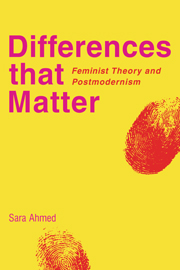1 - Rights
Published online by Cambridge University Press: 22 September 2009
Summary
In what space does feminism belong? It is this kind of question concerning belonging – concerning the proper space of feminism – that has led to a representation of feminism as straddled between the contradictory demands of practice and theory. On the one hand, feminism has been identified as inherently modern – as a politics committed to emancipation, agency and rights. But on the other hand, feminism has been seen to be pulled towards the postmodern, to the very critique of the onto-theological nature of such beliefs. Here feminism, as a set of theoretical perspectives, has increasingly been identified as postmodern or, as discussed in the introduction, as derivative of postmodernism. This division between modern and postmodern elements in feminism is hence mapped on to a division between practice and theory. Regina Gagnier, for example, argues that feminism cannot undermine its basis in a realist epistemology nor its normative ground in humanism, given that it presupposes that the oppression of women exists and that its project is to make the world better for women (Gagnier 1990: 24). But, at the same time, she argues that feminism is pushed towards a postmodern ethics and politics via its very emphasis on the culturally overdetermined constitution of the gendered subject (Gagnier 1990: 24).
- Type
- Chapter
- Information
- Differences that MatterFeminist Theory and Postmodernism, pp. 23 - 44Publisher: Cambridge University PressPrint publication year: 1998



